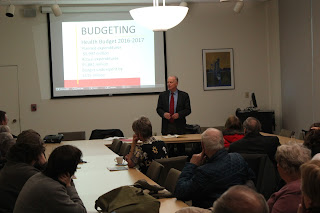February 21, I was in Brandon to launch our public consultations on the status of Health Care in Manitoba. There is a major concern over Health Care in Manitoba at the moment, in part because the Pallister PCs have been making major changes and these are causing concern, uncertainty and low morale within the health care system.
In each of our public meetings, as part of our effort to see where health care is at, we asked three questions. 1) What is working well? This question is important because the starting place for improving our health care system is understanding what is working well. Items that fall in this category need to be supported and indeed built upon and used as models of good care to improve the system. 2) What is not working? This is an important question because it identifies where there are problems which need to be understood and addressed to improve the system. 3) Where do we need to invest? This is a critical question because it identifies areas which will need additional funding in order to correct the deficiency.
There was a good turnout for our Brandon meeting. People who came were engaged and were able to identify items in each of the three categories. A brief mention of some of these items is below: It is not exhaustive. A more complete report will come when we have finished out public meetings;
What is working well?
What is not working?
- In rural communities like Boissevain, because of the way rotations work, sometimes it is difficult to find our which Emergency Room in the area is open
- There is a shortage of certain specialists in Brandon. Anaesthetists, Otolaryngologists and cardiologists were mentioned.
- People having only 15 minutes with a doctor and being able to discuss only one or two items.
Where do we need to invest to improve our health care system?
- in mental and brain health supports
- in keeping people healthy
- in a tracking system for referrals, (like with parcels sent by Fed Ex or Canada Post), so people know where in the system they are.
In each of our public meetings, as part of our effort to see where health care is at, we asked three questions. 1) What is working well? This question is important because the starting place for improving our health care system is understanding what is working well. Items that fall in this category need to be supported and indeed built upon and used as models of good care to improve the system. 2) What is not working? This is an important question because it identifies where there are problems which need to be understood and addressed to improve the system. 3) Where do we need to invest? This is a critical question because it identifies areas which will need additional funding in order to correct the deficiency.
There was a good turnout for our Brandon meeting. People who came were engaged and were able to identify items in each of the three categories. A brief mention of some of these items is below: It is not exhaustive. A more complete report will come when we have finished out public meetings;
What is working well?
- - The Seventh Street Access Centre is working
well.
- - Ambulance service in Brandon is quick, efficient
and friendly
- - A nurse practitioner working with a doctor in
Wawanesa
- - Local pharmacists as part of the health care
team
- - Health care aids are playing an important role
in personal care homes – they get to know the residents well and treat people
well
What is not working?
- In rural communities like Boissevain, because of the way rotations work, sometimes it is difficult to find our which Emergency Room in the area is open
- There is a shortage of certain specialists in Brandon. Anaesthetists, Otolaryngologists and cardiologists were mentioned.
- People having only 15 minutes with a doctor and being able to discuss only one or two items.
Where do we need to invest to improve our health care system?
- in mental and brain health supports
- in keeping people healthy
- in a tracking system for referrals, (like with parcels sent by Fed Ex or Canada Post), so people know where in the system they are.


I enjoyed hearing the Forum in the Louis Riel Room at B.U. I felt that you (Jon), and the group present showed a genuine and sincere interest in the possibilities of improvement. I heard several good ideas and learned about a few good ideas and supports that I previously did not know.
ReplyDeleteI believe it was mentioned that one of the major health concerns in MB is Diabetes. Nutrition was of course high on the list of prevention suggestions. However, when I spoke with a friend from Cross Lake about proper diet, sensible grocery shopping, gardens, cooking lessons, I was told that first and foremost the problem of alcoholism would be need to be addresses and rectified before other processes would work.
I noticed an article on Facebook I believe, on a hydroponics garden in northern Manitoba begin successful.That sounds like a good idea, doesn't it?
Thank-You for the well organized efforts towards improvement processes. I wish you continued success.
E. Tardiff